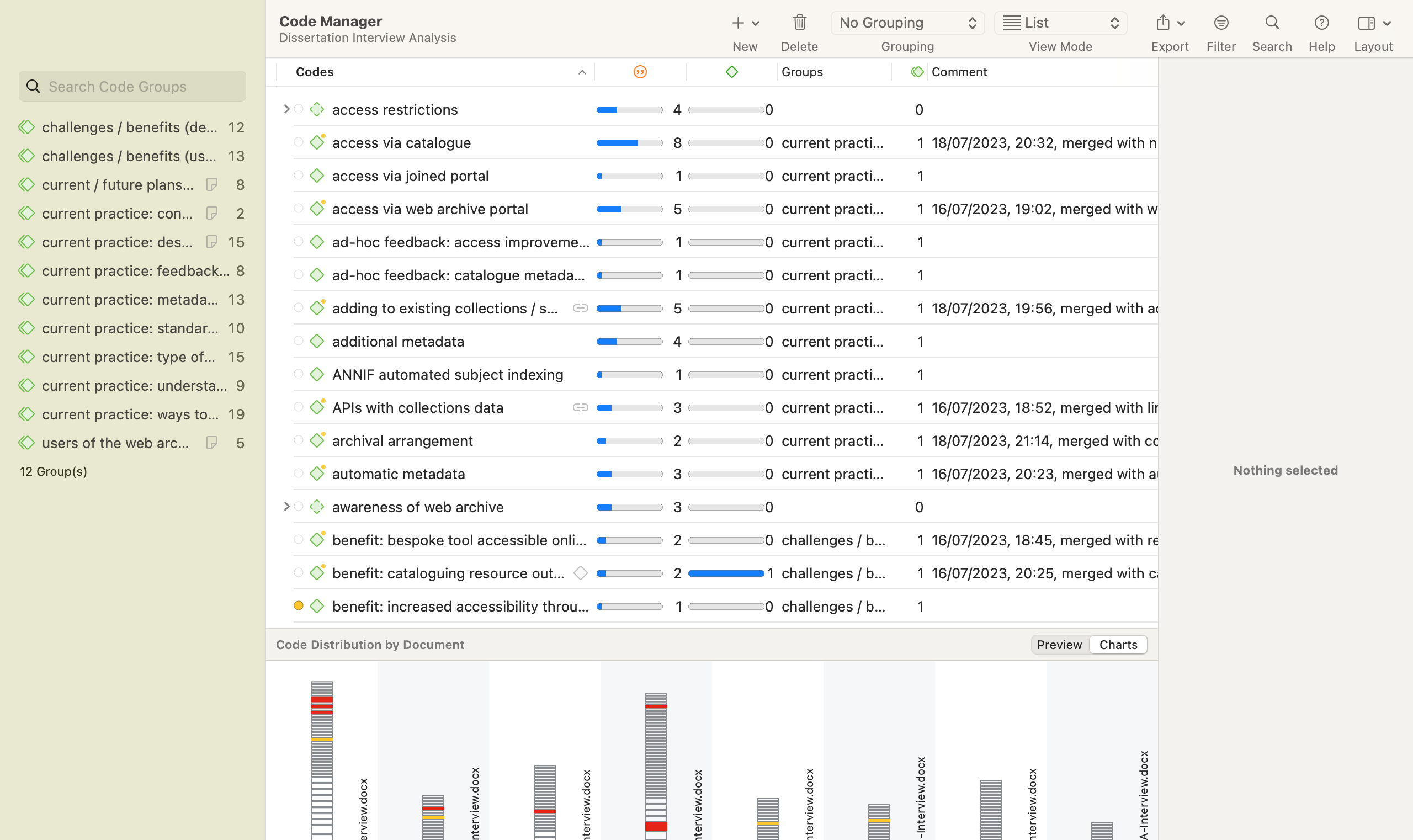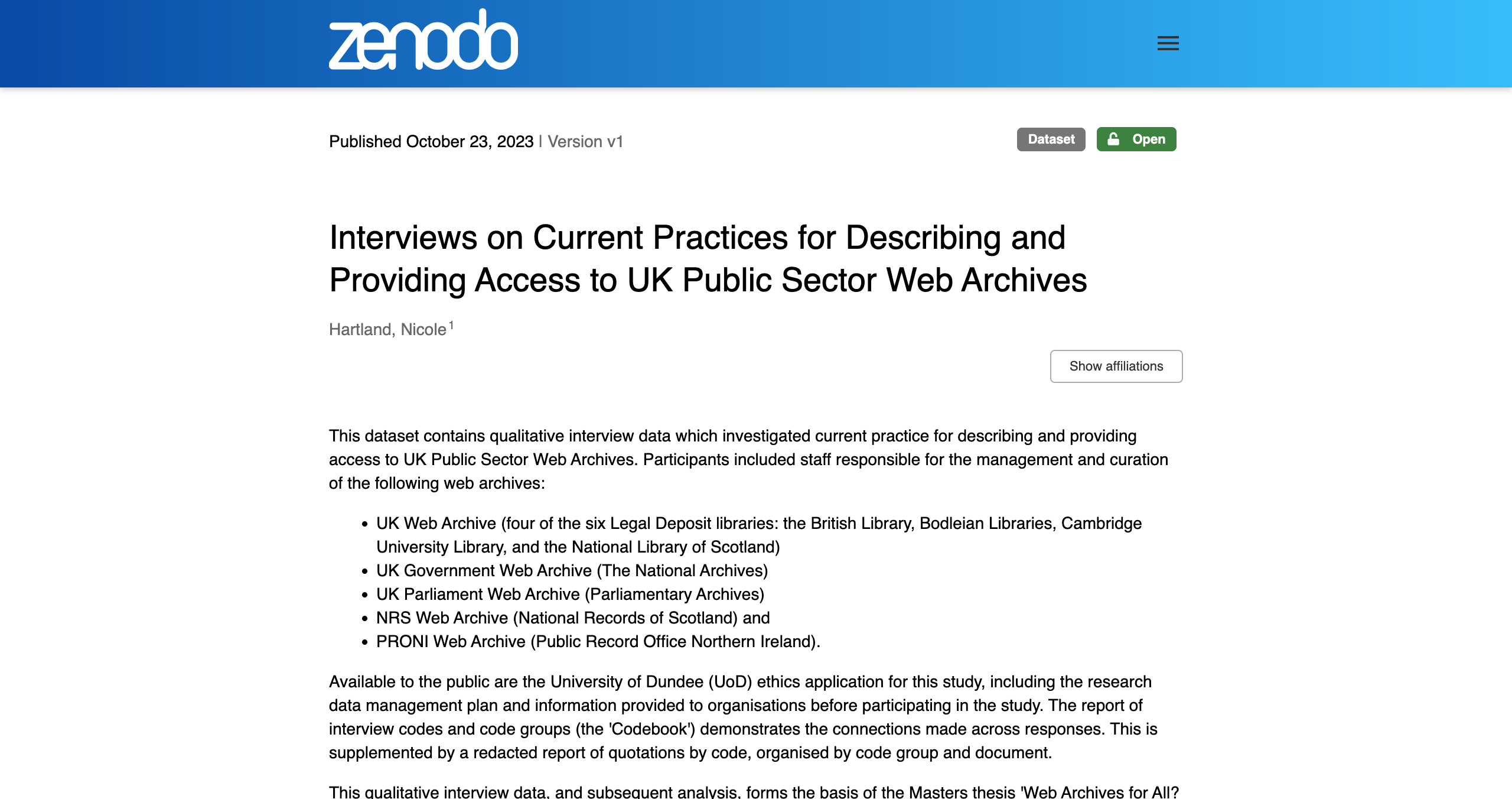Web Archives for All? is the first holistic assessment of access and descriptive practices across UK Public Sector Web Archives, with a focus on developing community best practices to begin to address the vital issue of working towards just and equitable access to our shared online heritage. This innovative study, conducted as an Archives and Records Management MLitt dissertation at the University of Dundee, was undertaken by Nicole Hartland alongside her role as UK Parliament’s Digital Archivist. The project comprises two outputs: the dissertation and the practitioner interview dataset including qualitative coding analysis.

The aim of the project was to explore web archive description and user access, and critically engage with both current practice at UK Public Sector Web Archives and emerging best practices in cataloguing and non-specialist user access. The four objectives were to gain a holistic overview of current practice, challenges, and opportunities through staff interviews; explore how far best practices for descriptive metadata and non-specialist user access exist and identify key challenges and future opportunities; examine the impact of sustainable resourcing on the provision of equitable access; and support smaller-scale or community initiatives in describing and providing access to web archives.
This dissertation explored the limited existing literature on equitable access to web archives, bringing together best practices and organisational approaches with critical library and archive science approaches. To address gaps in the literature, interviews were conducted with staff at eight national memory institutions involved in the curation and management of web archives. From this, current practice for describing collections, providing access to collections, and engaging with users on their needs were examined. This qualitative analysis showed that current approaches differed greatly between institutions and that there were no overarching best practices or working groups to address the unique challenges of describing or providing access to web archives.
How far current practice aligned with best practice, to what extent suitable best practices exist, and areas of existing consensus which could be developed into future best practices were then explored. One existing descriptive metadata best practice from OCLC proved workable with modifications to meet the challenges specific to the UK context. For both description and user access however, there was a need for other best practices to be developed through using wider digital preservation frameworks and existing areas of consensus as a starting point – perhaps utilising a ‘good’, ‘better’, ‘best’ approach. Current and best practice was then analysed through an equity-focussed lens, with an emphasis on how community-defined best practices could be an important tool in working towards equitable access. Three key areas on inequity were outlined in addition to three areas where equitable approaches are already in place and should be developed from this foundation. The far-reaching impacts of this work were highlighted, including the ability to redress the power imbalances inherent in information creation and distribution enabling web archives to fulfil their responsibilities to the public as custodians of their information leading to greater transparency, accountability, and public participation in knowledge production.
The dissertation demonstrated that current access is not currently equitable for all potential users of web archives, meaning web archives are not meeting their obligations, as publicly funded institutions, to meet the needs of ‘the public’. Key reasons for this are access restrictions under NPLD and the scale of PWA collections with comparatively little resource to describe and provide access to them. A lack of best practice in a UK context compounds these issues, with current service provision mixed across the sector exacerbating access issues for users. A way forward is highlighted however, through equitable community collaboration to establish best practices and a more ‘joined up’ approach – beneficial for both web archive practitioners and users – with a focus on access for all.
The project is innovative in its consideration of digital preservation principles - proactive management, ethical and social responsibility, and the importance of metadata in providing meaningful access to users – by centring general and non-specialist users of UK Public Sector web archives. The impact of the study is further underscored by its commitment to transparency and openness. By making interview data and analysis openly available through platforms like Zenodo and utilising freely accessible tools like Atlas.ti, the study promotes collaboration and advancement within the digital preservation community. This commitment to openness ensures that the findings and methodologies of the study can be readily utilised by researchers and practitioners, contributing to the ongoing advancement of digital preservation and web archiving efforts.

Despite being undertaken as an unfunded student dissertation, the study has had a sector-wide impact, thanks to the dedication and collaborative efforts of all involved parties. Feedback from peers, workshop attendees, and interviewees highlights the study's timeliness and importance, extending beyond typical expectations for a dissertation. The study's significance is further affirmed by its recognition by the editors of the Archives and Records journal, who requested a draft for peer review, as well as its invitation for presentation at the DPC Web Archiving and Preservation Working Group. The study’s focus is particularly timely as web archives begin to emerge outside national memory institutions in the UK, and a focus on equity throughout the digital preservation lifecycle enters the mainstream - recent changes to the DPC RAM criteria. These archives serve as vital records of governmental activities, societal trends, and cultural shifts, offering insights into governance evolution and digital citizenship. By promoting equitable access to these archives, the study ensures that the benefits of this rich resource are accessible to all individuals, regardless of background or expertise, thereby fostering greater public engagement with our national online heritage.
'Web Archives for All?' is an impactful and timely contribution from a student and new professional in the field. Its innovative approach, commitment to transparency, and focus on promoting equitable access to web archives make it a strong candidate for this award. As web archiving initiatives continue to expand, the lessons and insights gleaned from this study will, I hope, promote collaboration and community best practices leading to a more inclusive and democratic approach to web archiving, making our national web archives accessible for all.





























































































































